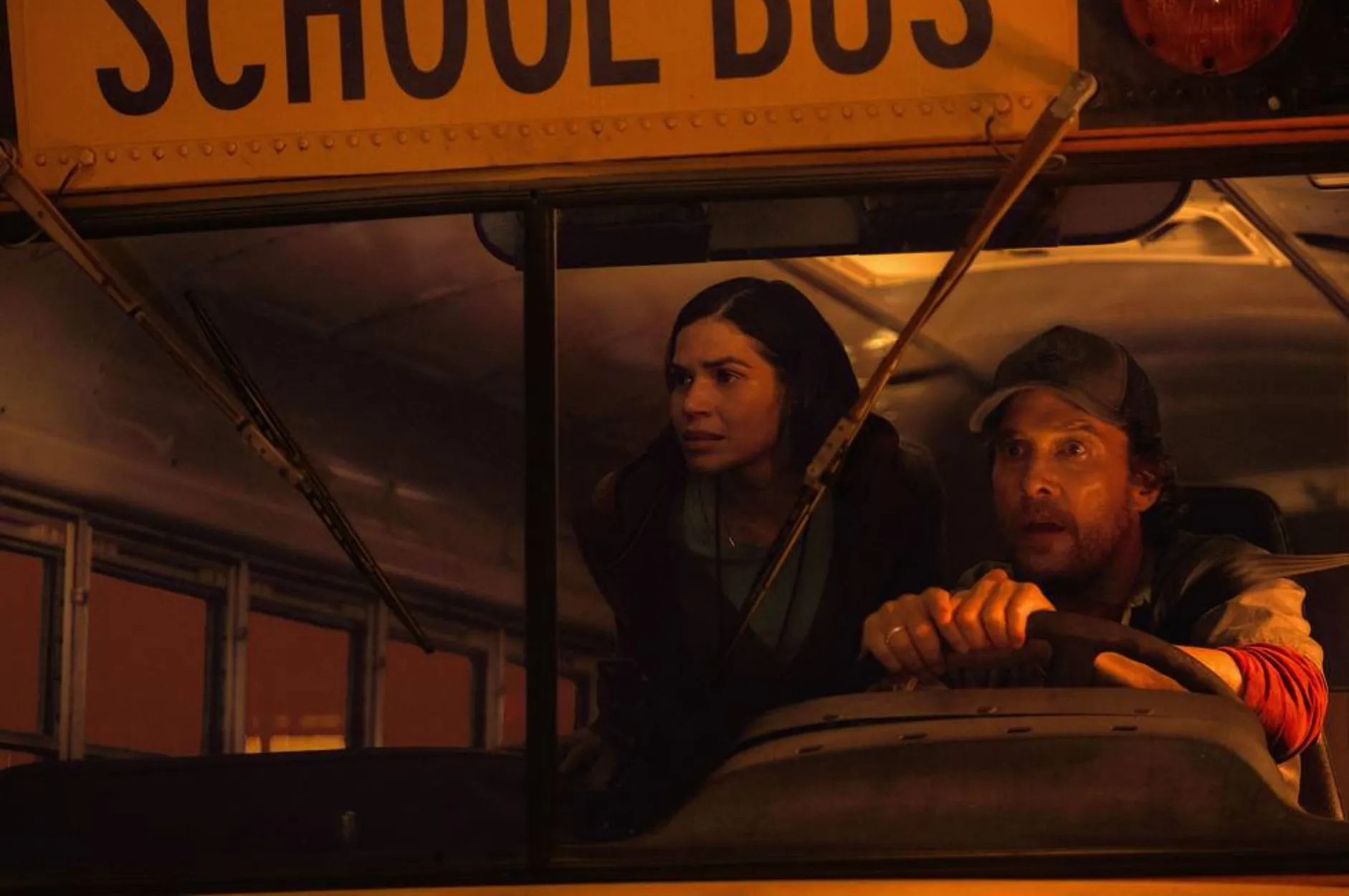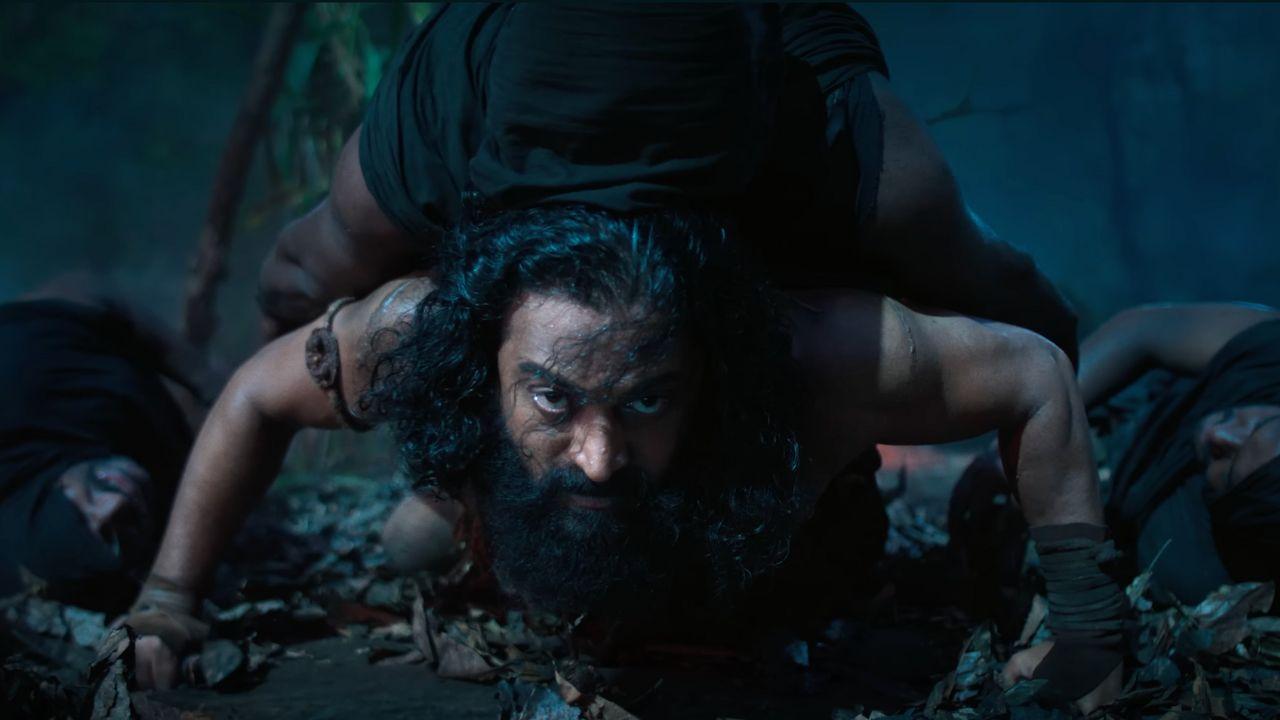Wildfire survival stories always manage to strike my heartstrings. Being from a country that’s ravaged by this tragedy every year, often near my home region, the theme resonates more viscerally for me than for other viewers from countries without this environmental problem. It’s a reality I know not just from the news, but from the smell of smoke in the air and the anxiety that settles over the community. Therefore, in approaching The Lost Bus, my expectations were intrinsically linked to that familiarity. Knowing that the film was directed by Paul Greengrass (Captain Phillips), I prepared myself for an experience that wouldn’t be mere entertainment, but an almost documentary-like confrontation with the chaos and heroism that can emerge from the ashes.
The filmmaker, who co-wrote the screenplay with Brad Ingelsby (Mare of Easttown), bases the story on the true events of Camp Fire, the devastating blaze that swept through the town of Paradise, California, in 2018. The narrative centers on Kevin McKay (Matthew McConaughey), a school bus driver, and Mary Ludwig (America Ferrera), a teacher, who find themselves in the middle of hell. With the roads blocked and the fire consuming everything around them, the two make the courageous decision to guide a bus full of children through the smoke and flames in a desperate attempt to find safety.
The great triumph of The Lost Bus lies in its ability to capture the claustrophobic and terrifying atmosphere of being trapped by a fire of apocalyptic proportions. Greengrass uses the dynamic camera of cinematographer Pal Ulvik Rokseth (22 July) to place us inside the bus, amidst the dense smoke and the pitch-black landscape, where day turns into a nightmarish evening, tinged with a threatening orange-red hue. The decision to occasionally blend real footage of the disaster with fiction is perfectly executed, not only to underscore the story’s authenticity but also to ‘prove’ that its overwhelming scale wasn’t a simple dramatic effect. The movie brutally and effectively conveys the sense of helplessness and constant fear as we follow not only the protagonists’ struggle for survival but also the life-or-death decisions that firefighters and rescue teams are forced to make — impossible choices where the only option is the one that will, hopefully, kill fewer people.

In this chaotic scenario, The Lost Bus explores the duality of human nature in moments of crisis. It’s bleak, but terribly accurate, to see how some people resort to looting and violence, adopting the “every man for himself” motto instead of uniting as a community. This is a sad truth the film isn’t afraid to show. However, it’s in the contrast that the movie finds its strength, celebrating the brave souls who, like Kevin and Mary, put the lives of others before their own. The nature of heroism is, without a doubt, the narrative’s central theme. Greengrass and Ingelsby powerfully argue that heroes aren’t mythical figures, but ordinary people, often full of personal flaws and burdened by their own problems, who are thrown into extraordinary circumstances and, moment by moment, choose to do the right thing.
Kevin’s arc, played with a heartfelt conviction by McConaughey (Interstellar), is that of a man lost in his failures who finds a redemptive purpose in the act of protecting the most vulnerable. It’s a subtle but impactful transformation. Both he and Ferrera (Barbie) deliver convincing performances, capturing the desperation of the situation but also the bravery needed to keep going. However, it’s precisely in its character development that The Lost Bus stumbles. Although Kevin’s journey is about redemption, his relationship with his own son is treated superficially and is never truly deepened or resolved. The story ends on a hopeful note, but it lacks the groundwork to make that hope feel fully earned, leaving his personal arc somewhat incomplete.
This superficiality is a symptom of another problem with The Lost Bus: an excessive runtime that isn’t fully justified. The narrative inevitably hits a point of repetitiveness and predictability common to this type of story, which wouldn’t be a problem if the film were more concise. With a longer duration, one would expect a deeper dive into the psychology of its characters, but that never happens. Instead, the emotional resolution is often relegated to expository dialogue near the end, where the characters verbalize everything they’ve felt and feel in a single interaction, a shortcut that feels unnatural.
The Lost Bus is a powerful and technically impressive work in its depiction of a disaster, capturing the terror and human resilience with breathtaking authenticity. The performances are strong, and its message about everyday heroism is genuinely moving. However, it’s handicapped by a bloated narrative and superficial character development that prevent it from achieving greatness. Even so, its strength lies in its ability to remind us of the fragility of life and the extraordinary courage that can be found in the hearts of ordinary people.






